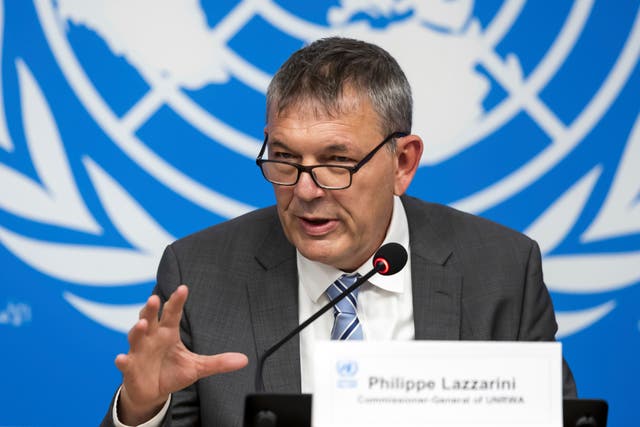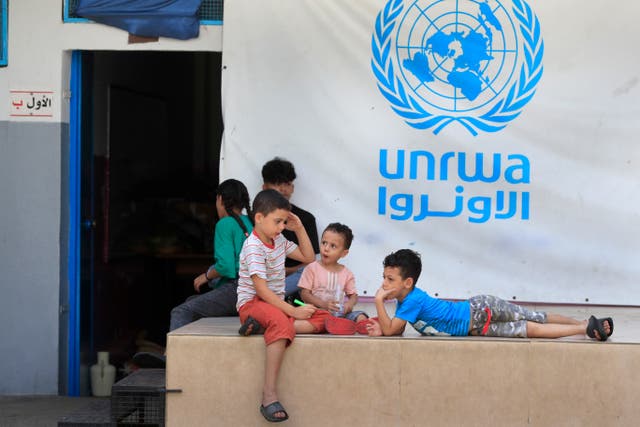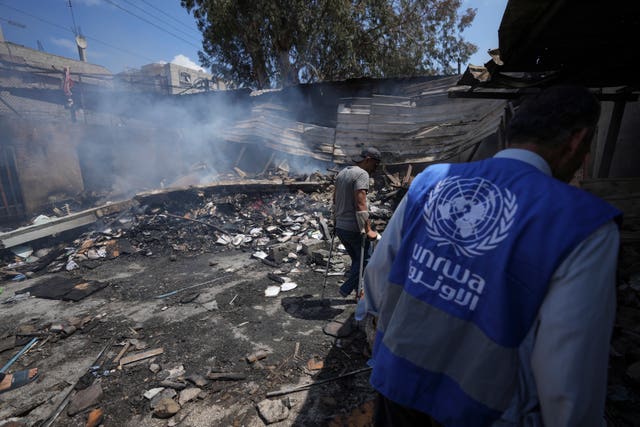What could Israel’s legislation on UN aid agency mean for Gaza?
The laws ban UNRWA from operating in Israel, designate it a terror organisation, and cut all ties between the agency and the Israeli government.

Israel’s parliament has passed two laws that could prevent the UN agency for Palestinian refugees, a main provider of aid to Gaza, from being able to continue its work.
The laws ban the agency, UNRWA, from operating in Israel, designate it a terror organisation, and cut all ties between the agency and the Israeli government.
It is the culmination of a long-running campaign against the agency, which Israel contends has been infiltrated by Hamas. But supporters say Israel’s real aim is to sideline the issue of Palestinian refugees.
The agency is the major distributor of aid in Gaza and provides education, health and other basic services to millions of Palestinian refugees across the region, including in the Israeli-occupied West Bank.
The head of the agency, commissioner general Philippe Lazzarini, called the move “unprecedented” on X, formerly Twitter, following the vote and said the Bills “will only deepen the suffering Palestinians, especially in Gaza where people have been going through more than a year of sheer hell.”
Israel accuses the agency of turning a blind eye to staff members it says belong to Hamas, divert aid and use UNRWA facilities for military purposes.
Israel says around a dozen of its 13,000 employees in Gaza participated in the October 7 2023 attack on southern Israel. The agency denies it knowingly aids armed groups and says it acts quickly to purge any suspected militants among its staff.
– How will the Bills hamper UNRWA?
One of the Bills passed on Monday evening bans all UNRWA activities and services on Israeli soil and is set to take effect in three months.
The second Bill designates UNRWA a terrorist organisation, severs all ties between government employees and UNRWA and strips its staff of their legal immunities.
Together, the Bills likely bar the agency from operating in Israel and the Palestinian territories, because Israel controls access to both Gaza and the West Bank. It could force the agency to relocate its headquarters from Israeli-annexed east Jerusalem.
Mr Lazzarini warned earlier this month that humanitarian operations in Gaza “may disintegrate” if the legislation passed, disrupting the provision of food, shelter and healthcare as winter sets in.
Gaza’s population of some 2.3 million is almost entirely dependent on aid to survive. Around 90% of the population has been displaced.
Hundreds of thousands live in tent camps and schools-turned-shelters, most run by UNRWA. Experts say hunger is rampant.
Israel’s campaign in Gaza in retaliation for the October 7 attack has killed more than 43,000 Palestinians, according to Gaza’s health ministry, whose count does not differentiate between civilians and militants.

Israel is reportedly considering taking over aid distribution itself or subcontracting it, but it has yet to put forth a concrete plan. Any such effort would likely require a large number of troops and other resources at a time when Israel is at war on two fronts in Gaza and Lebanon.
Other UN agencies and aid groups say there is no substitute for UNRWA, which also runs 96 schools hosting around 47,000 students, three vocational training centres and 43 health centres in the Israeli-occupied West Bank.
– What is UNRWA’s history?
The UN Relief and Works Agency for Palestinian Refugees in the Near East was established to help the estimated 700,000 Palestinians who fled or were driven out of what is now Israel during the 1948 war surrounding Israel’s creation.
UNRWA supporters say Israel hopes to erase the Palestinian refugee issue by dismantling the agency. Israel says the refugees should be permanently resettled in other countries, and Israeli opponents of the agency have suggested ending UNRWA services would force them to do so.
Palestinians say refugees and their descendants, who now number nearly six million, should be allowed to exercise their right under international law to return home. Israel refuses, saying the result would be a Palestinian majority inside its borders.
The issue was among the thorniest in the peace process, which ground to a halt in 2009.
UNRWA operates schools, health clinics, infrastructure projects and aid programmes in refugee camps that have grown into urban neighbourhoods in Gaza, the West Bank, Lebanon, Syria and Jordan.

– Why is there a dispute over UNRWA’s neutrality?
Israel says hundreds of Palestinian militants work for UNRWA, without providing evidence, and that more than a dozen employees took part in Hamas’s October 7 2023 attack.
UNRWA immediately fired the employees accused of taking part in the attack, in which Hamas-led militants killed some 1,200 people and abducted around 250.
An independent investigation earlier this year found that UNRWA had “robust” mechanisms to ensure its neutrality but pointed to gaps in implementation, including staff publicly expressing political views and textbooks with “problematic content” in UNRWA-run schools.
UNRWA says it thoroughly investigates any allegations of wrongdoing and holds staff accountable, and that it provides lists of all of its staff to Israel and host countries. It says Israel has largely ignored its requests to provide evidence for its claims against staffers.
Israel has repeatedly struck UN schools-turned-shelters, claiming Hamas fighters operate inside them. It also says it has uncovered tunnels running near or under UNRWA facilities.
UNRWA has long been the biggest single employer in Gaza, where the population has been impoverished by years of Israeli and Egyptian blockade.
Hamas has ruled the territory since 2007, and it has civilian political operations alongside its armed wing.
The militant wings of Hamas and other groups are highly secretive, their members virtually unknown outside of intelligence agencies. That complicates efforts by civilian organisations to vet employees.
Fatah Sharif, an UNRWA teacher in southern Lebanon, was killed last month along with his family in an Israeli airstrike. It then emerged that he was a senior Hamas commander, something he had kept secret.
Mr Lazzarini, UNRWA’s head, said Mr Sharif was suspended without pay in March after the agency learned he belonged to Hamas’s political party, and that an investigation had been launched. He said he did not know Mr Sharif was a militant commander until after his death.

– Does UNRWA have international support?
Several western countries suspended funding for UNRWA after the allegations related to the October 7 attack. All except the United States, which had been its biggest donor, have since restored it.
The Biden administration recently warned Israel that if it did not allow more aid into Gaza it could lose out on some of the crucial American military assistance it has relied on throughout the war.
The letter sent by US Secretary of State Antony Blinken and Defence Secretary Lloyd Austin to their Israeli counterparts said they shared Israeli concerns about “the serious allegations” of UNRWA employees taking part in the October 7 attack and of “Hamas misusing UNRWA facilities”.
But it said enacting the Bills’ restrictions “would devastate the Gaza humanitarian response at this critical moment … which could have implications under relevant US law and policy”.
A joint statement from Canada, Australia, France, Germany, Japan, South Korea and the UK last week expressed “grave concern” over the legislation.
It said the agency provides “essential and life-saving humanitarian aid,” the provision of which would be “severely hampered, if not impossible” without it.





